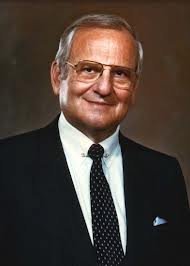History
Blind people have used canes as mobility tools for centuries.
In 1921 James Biggs, a photographer from Bristol who became blind after an accident and was uncomfortable with the amount of traffic around his home, painted his walking stick white to be more easily visible.
In 1931 in France, Guilly d'Herbemont launched a national white stick movement for blind people. On February 7, 1931, Guilly d'Herbemont symbolically gave the first two white canes to blind people, in the presence of several French ministers. 5,000 more white canes were later sent to blind French veterans from World War I and blind civilians.
The first special white cane ordinance was passed in December 1930 in Peoria, Illinois, granting blind pedestrians protections and the right-of-way while carrying a white cane.
The long cane was improved upon by World War II veterans rehabilitation specialist, Richard E. Hoover, at Valley Forge Army Hospital. In 1944, he took the Lions Club white cane (originally made of wood) and went around the hospital blindfolded for a week. During this time he developed what is now the standard method of "long cane" training or the Hoover Method. He is now called the "Father of the Lightweight Long Cane Technique". The basic technique is to swing the cane from the center of the body back and forth before the feet. The cane should be swept before the rear foot as the person steps. Before he taught other rehabilitators, or "orientors", his new technique he had a special commission to have light weight, long white canes made for the veterans of the European fronts.
Hoover's long cane technique was perfected at Edward Hines Jr. VA Hospital, which opened the Department of Veterans Affairs' first Blind Rehabilitation Center in 1948 and was staffed by former Valley Forge Army Hospital instructors.
On October 6, 1964, a joint resolution of the Congress, HR 753, was signed into law authorizing the President of the United States to proclaim October 15 of each year as "White Cane Safety Day". President Lyndon Johnson was the first to make this proclamation.
Children and canes
In many countries, including the UK, a cane is not generally introduced to a child until they are between 7 and 10 years old. However, more recently canes have been started to be introduced as soon as a child learns to walk to aid development with great success.
Joseph Cutter and Lilli Nielsen, pioneers in research on the development of blind and disabled children, have begun to introduce new research on mobility in blind infants in children. Cutter's book, Independent Movement and Travel in Blind Children, recommends a cane to be introduced as early as possible, so that the blind child learns to use it and move around naturally and organically, the same way a sighted child learns to walk. A longer cane, between nose and chin height, is recommended to compensate for a child's more immature grasp and tendency to hold the handle of the cane by the side instead of out in front. Mature cane technique should not be expected from a child, and style and technique can be refined as the child gets older.
Legislation about canes
While the white cane is commonly accepted as a "symbol of blindness", different countries still have different rules concerning what constitutes a "cane for the blind".
In the United Kingdom, the white cane indicates that the individual has a visual impairment but normal hearing; with red bands added, it indicates that the user is deafblind.
In the United States, laws vary from state to state, but in all cases, those carrying white canes are afforded the right-of-way when crossing a road. They are afforded the right to use their cane in any public place as well. In some cases, it is illegal for a non-blind person to use a white cane with the intent of being given right-of-way.
In November 2002, Argentina passed a law recognizing the use of green canes by people with low vision, stating that the nation would "adopt from this law, the use of a green cane in the whole of Argentina as a means of orientation and mobility for people with low vision. It will have the same characteristics in weight, length, elastic grip and fluorescent ring as do white canes used by the blind."
In Germany, people carrying a white cane are excepted from the Vertrauensgrundsatz (trust principle), therefore meaning that other traffic participants should not rely on them to adhere to all traffic regulations and practices. Although there is no general duty to mark oneself as blind or otherwise disabled, a blind or visually impaired person involved in a traffic accident without having marked themselves may be held responsible for damages unless they prove that their lack of marking was not causal or otherwise related to the accident.
Sweet 'n' Spicy Corn Bread
- 3 cups cornmeal
- 1 cup all-purpose flour
- 2 cups milk
- 2 eggs
- 1/4 cup melted butter
- 1 (4.5-ounce) can chopped green chilies, drained
- 1/4 cup light brown sugar
- 1 tablespoon baking powder
- 1 teaspoon salt
- Preheat oven to 400º. Coat a 9-inch deep-dish pie plate with cooking spray.
- In a large bowl, combine all ingredients; mix well. Pour batter into prepared pie plate.
- Bake 25 to 30 minutes, or until golden and a toothpick inserted in center comes out clean. Let cool 5 to 10 minutes, then slice into wedges and serve warm.
***For an added treat, slather on the butter and finish this off with a drizzle of honey.
National Grouch Day on October 15th sends out notices to all the grouches of the world to be their truest grouch. If you are a grouch, today is your special day. According to Sesame Street Magazine, the day celebrates all grouches and their way of life.
Sometimes grumps give backhanded compliments. “Your house looked horrible until you painted it.” Other times they don’t give them at all. Noise, silence, general activity makes a grouch generally unpleasant.
- a person who complains frequently or constantly
- a habitually irritable or complaining person
It seems that a grouch may be happy (although they would never admit it) only when others are unhappy and grouchy. It is then that they feel most comfortable with having others share in their grumpy, cantankerous, surly world with them.
This Sesame Street-inspired holiday has been celebrated since at least 1976 and celebrates the grouch’s way of life.
Grouch FAQ
Q. Who were some famous grouches?
A. Most famous grouches are fictional. They include names like Oscar the Grouch, Archie Bunker, and the Grinch.
Q. What word is the opposite of grouch?
A. A person who is a happy camper is someone who is generally joyful and satisfied.














